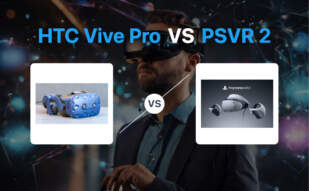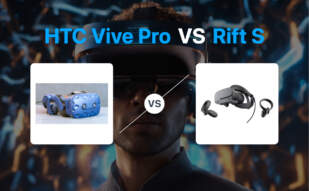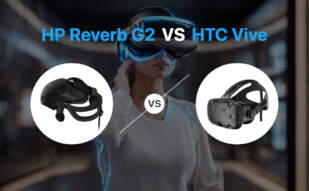Key Differences Between HTC Vive Pro and Meta Quest Pro
- Design & Build: HTC Vive Pro’s navy blue, comfortable design contrasts Quest Pro’s sleek, black finished professional look.
- Display & Audio: While the Vive Pro boasts AMOLED screens, the Quest Pro harnesses a powerful Snapdragon XR2+ processor for vibrant visuals.
- Price: At $799 without hardware, Vive Pro is more accessible than the $1499.99 Quest Pro, yet requires essential extras pushing the final cost.
- Market: Vive Pro is seen as an evolution targeting enthusiasts, while Quest Pro is specifically designed for professional use in mixed-reality scenarios.
At $799, the HTC Vive Pro offers sharper screens, improved audio and a comfortable design for enthusiasts. However, the Meta Quest Pro, priced at $1499.99, dominates in professional scenarios with its stronger Snapdragon XR2+ processor, abundant RAM, and mixed-reality capabilities. Choose according to your market orientation and budget.
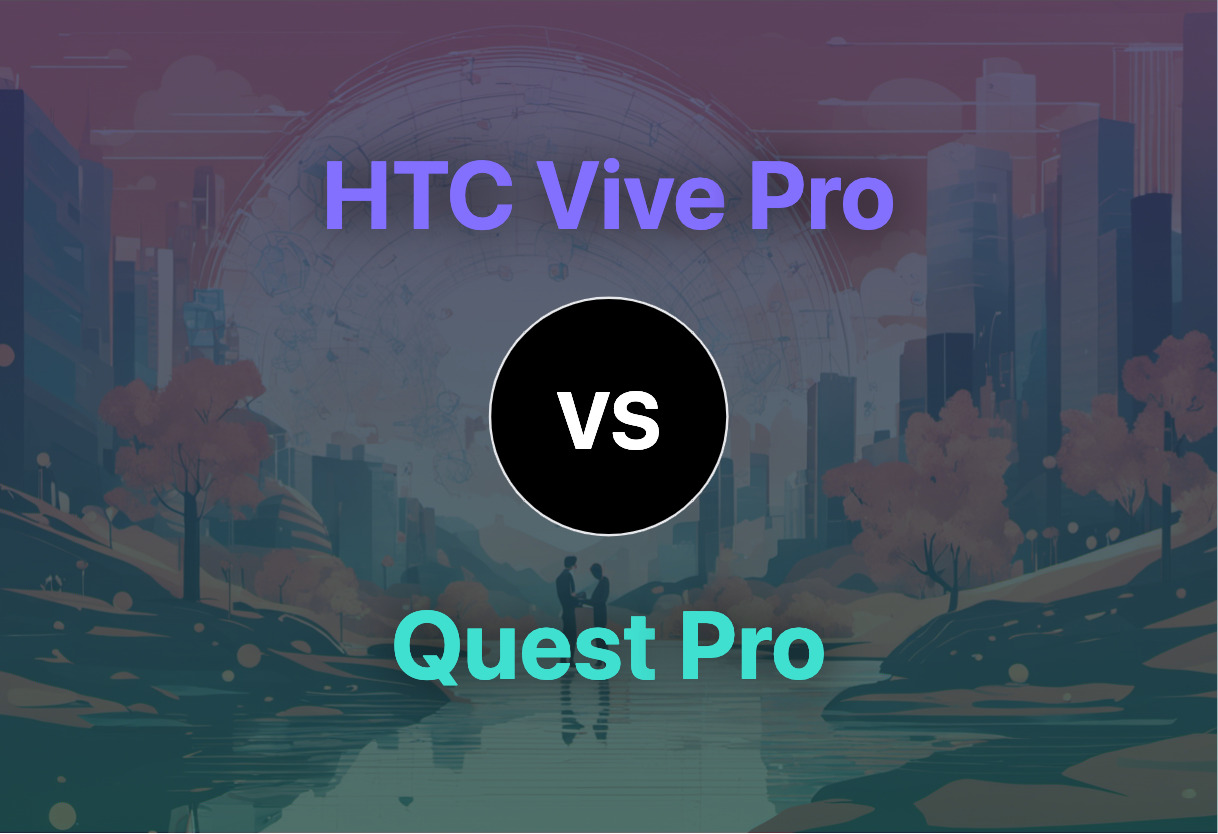
| Comparison | HTC Vive Pro | Meta Quest Pro |
|---|---|---|
| Cost | $799 (+$300 for additional bundle) | $1499.99 |
| Design Attributes | Comfortable, secure, navy-blue, dual outward-facing cameras | Sleek, professional, black, glossy, padding for comfort |
| Sound Features | Built-in headphones, faux-leather earpads, volume rocker and mute button controls | Two headphone jacks, angled speakers |
| Visual Capabilities | A dual 3.5-inch 1440×1600 AMOLED screen with a 90Hz refresh rate and 110-degree viewing angle | Resolution of 1,920 x 1,800 pixels per eye, local dimming backlight system |
| Hardware | Connects to PC through a Link Box and compatible with original Vive’s base station and motion controllers | Snapdragon XR2+ processor, 12GB RAM, 256GB storage |
| Software and Additional Capability | Improved gaming controls and higher resolution with powerful audio system in VR games | Meta Horizon Worlds with customized interfaces for collaborative work, face and eye tracking, full-color pass-through cameras |
| Target Market | Ideal for enthusiasts, professionals or people with a lot of disposable income | Suited for professionals with specific VR/AR needs |
What Is HTC Vive Pro and Who’s It For?
The HTC Vive Pro is a virtual reality headset defined by its advanced features and superior visuals. Born from the original HTC Vive, this navy-blue device has been refreshed with sharper screens, improved audio capabilities, and the introduction of dual outward-facing cameras for 3-D tracking stereoscopic vision. However, don’t mistake this as a replacement for the original Vive, rather view it as an evolution. Priced at a hefty $799 (excluding base stations and motion controllers), it’s clear that the Vive Pro is designed for hardcore VR enthusiasts and professionals with a disposable income who are chasing cutting-edge VR experiences.

Pros of HTC Vive Pro
- Enhanced audio and display capabilities
- Improved gaming controls
- Comfortable and secure design
- High pixel density for sharper images
Cons of HTC Vive Pro
- High price point
- Does not include base stations and motion controllers
- Minor upgrade from the original model
- Tethered to a computer
What Is Meta Quest Pro and Who’s It For?
The Meta Quest Pro stands as a professional-grade VR/AR headset, designed explicitly for enterprise users and workflows integration. This device brings together the worlds of virtual and real, at a price point of $1499.99, significantly above its counterpart, the Quest 2. With the sleek black design, powerful Snapdragon XR2+ processor, and a truckload of features such as local dimming backlight system and full-color pass-through cameras, the Meta Quest Pro is an investment for professionals seeking to elevate their VR/AR experiences.

Pros of Meta Quest Pro
- High processing power
- Advanced features for collaborative work
- Increased storage and RAM
- Improved resolution and color range compared to Quest 2
Cons of Meta Quest Pro
- High price point, catering to a niche market
- Limited software for consumer-focused activities
- Uncomfortable for prolonged use without optional accessories
- Design exposes peripheral vision
Determining Your Champion: HTC Vive Pro vs Meta Quest Pro
Two rival virtual warriors, HTC Vive Pro and Meta Quest Pro, bring their unmatched prowess to the battlefield of reality augmentation. Revealing where each shines, let’s analyze who should pledge allegiance to which tech titan.
Professionals Seeking High-End VR Experiences
HTC Vive Pro is your ace in the hole. Its highly improved visuals, powerful audio system, and 3D tracking stereoscopic vision render an unparalleled VR realm that transcends the original Vive experience. Note: The steep price ($799 + $300 for extra hardware) might be daunting. However, prioritizing superior gaming experience over budget makes HTC Vive Pro a worthy investment.
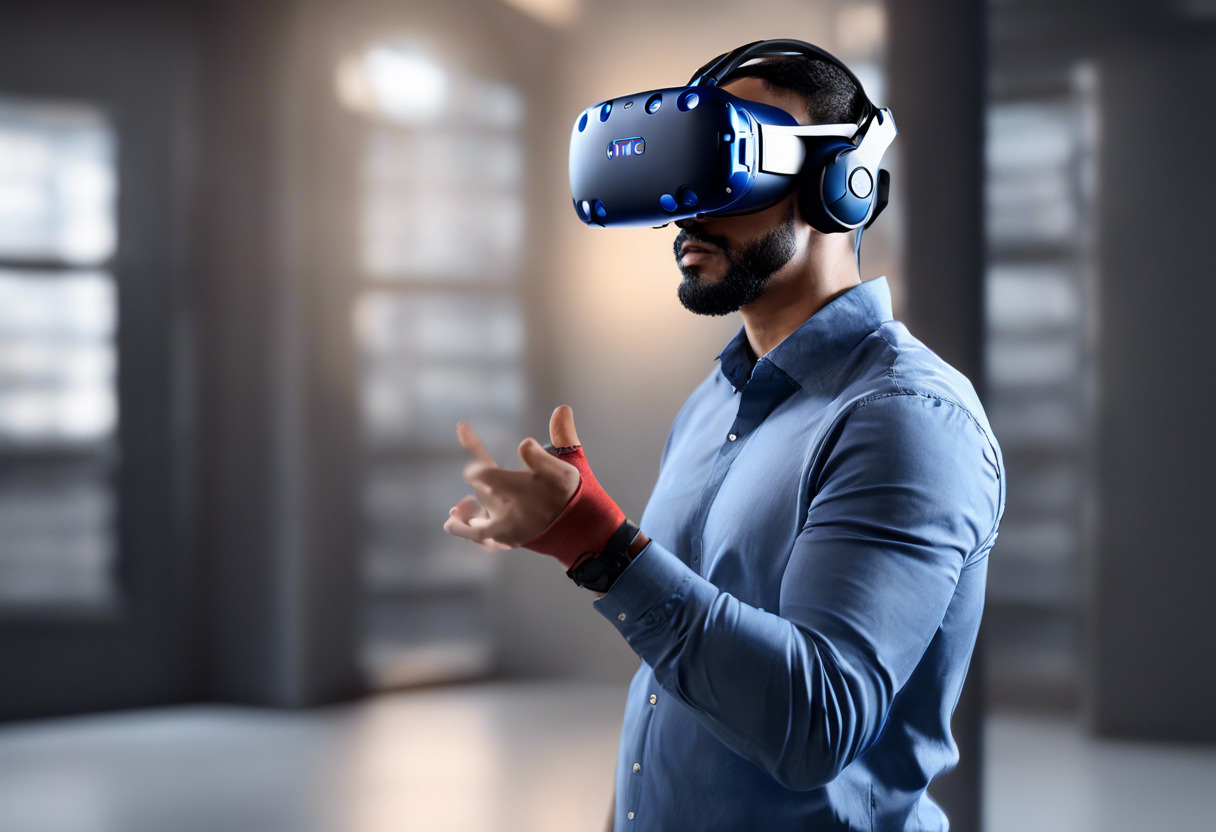
AR/VR Creators and Developers seeking Powerful Specs
Align your tech allegiance with Meta Quest Pro. Boasting a Snapdragon XR2+ processor, 12GB RAM, and 256GB storage, this titan caters to complex meta-creation workflows. An elevated cost ($1499.99) mirrors its superior specs and enterprise focus—directed towards creators with specific VR/AR needs.

Enthusiasts balancing Budget and Performance
If you seek performance without breaking the bank, pick the original HTC Vive. Retailing at $499, it includes controllers and room-scale tracking hardware—a tantalizing package combining affordability and satisfactory VR capabilities.

HTC Vive Pro sets a benchmark for high-end VR experiences, while Meta Quest Pro optimally serves AR/VR creators needing robust performance. The original HTC Vive reigns supreme for budget-conscious enthusiasts seeking decent VR experiences.
Tiffany Brise
Content writer @ Aircada, patiently awaiting a consumer AR headset that doesn’t suck.



